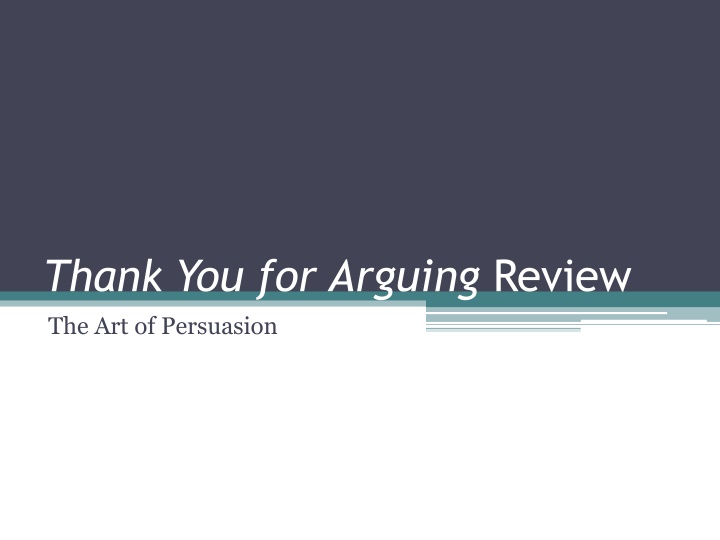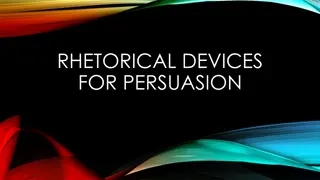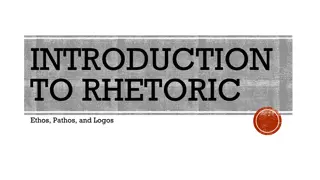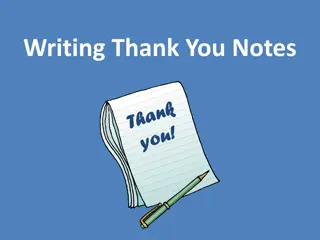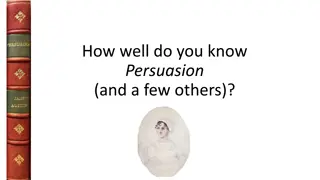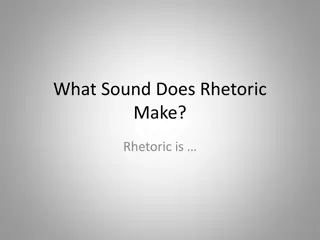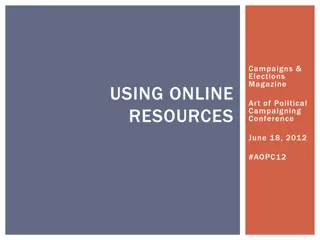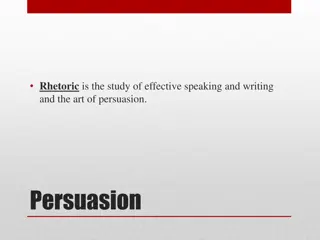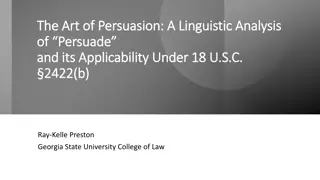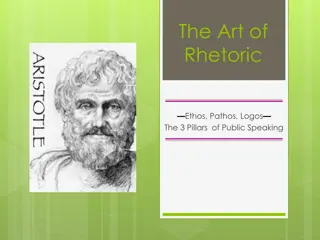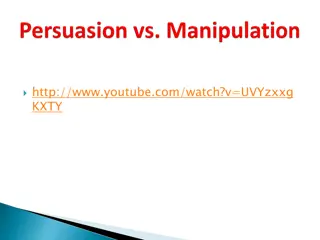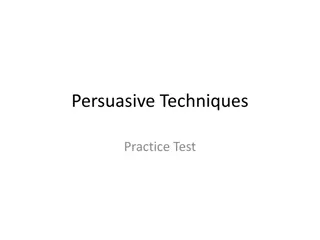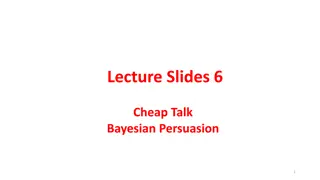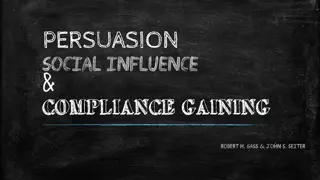Mastering the Art of Persuasion: A Review of "Thank You for Arguing
Explore the world of persuasion through the insightful chapters of "Thank You for Arguing." Unveil the power of rhetoric and sharpen your skills in influencing others. From understanding argument strategies to setting effective goals, this book is your guide to becoming a persuasive communicator.
Download Presentation

Please find below an Image/Link to download the presentation.
The content on the website is provided AS IS for your information and personal use only. It may not be sold, licensed, or shared on other websites without obtaining consent from the author.If you encounter any issues during the download, it is possible that the publisher has removed the file from their server.
You are allowed to download the files provided on this website for personal or commercial use, subject to the condition that they are used lawfully. All files are the property of their respective owners.
The content on the website is provided AS IS for your information and personal use only. It may not be sold, licensed, or shared on other websites without obtaining consent from the author.
E N D
Presentation Transcript
Thank You for Arguing Review The Art of Persuasion
Chapter 1: Open Your Eyes Argument is all around us (Ex. day without persuasion) Plays with our emotions, attitudes, decisions, impulses Need to decode argument s tricks with rhetorical skills Pinnacle of persuasion Attainment of agreement + getting the audience to act + future tense (Ex. Son + Toothpaste) Benefits of studying rhetoric Leadership skills, speaking/writing persuasively, producing worthy content, convincing others to like you
Chapter 1: Open Your Eyes Tips, Tools, Terms and Figures Rhetorical Jujitsu a form of concession that uses your opponents moves to your advantage Ex. Okay, lets tweak it. Syncrisis reframes an argument by redefining it Ex. Not manipulation, instruction Commonplace shared attitude by the audience Ex. Matrix Antithesis joining of opposing ideas Ex. Webster vs. Animal House Amplification layer your points Ex. Infomercial But wait, there s more
Chapter 1: Open Your Eyes Tips, Tools, Terms and Figures (continued) Argumentum a Fortiori (argument of strength) something words the hard way, its more likely to work the easy way. Ex. Timex Ironman Slam Dunk idea used elsewhere, describe its success in vivid detail, as though audience itself accomplished it. Ex. Manipulate your family with pure logic Chiasmus crisscross figure that repeats a phrase with its mirror image. Ex. JFK Ask not Canticleer Fallacy because B follows A, A caused B Named after the rooster who thought crowing made the sun rise Ex. JFK > Peace Corp enlistment
OFFENSE Chapter 2: Set Your Goals Fight each disputant tries to win Argument they try to win over an audience Deliberative Argument argument about choices Set your goals for the audience Concerned with matters in future tense Concerned with what s best for the audience Don t try to outscore opponent, try to get your way Example: How to Seduce a Cop Cicero s goals for persuasion Stimulate audience s emotions (mood) Change its opinion (mind) Get it to act (desire to act) Example: Uninterested Wife + Wine + Music + Compliment =Agreement
Chapter 2: Set Your Goals Tips, Tools, Terms and Figures Argument by the Stick fighting only inspires revenge or retreat Ex. George, age 2 Eristic debating that seeks to win points Note: let your opponent win points, you want to achieve the pinnacle of persuasion Prolepsis anticipatory concession, agreeing in advance to what the other person is likely to say Ex. Dorothy, Jr. s Indian Restaurant Humblebrag self-deprecating humor is an acceptable way to brag Ex. The South Beach Diet
OFFENSE Chapter 3: Control the Tense THREE CORE ISSUES TYPES OF RHETORIC Blame Who moved my cheese? Past-tense (forensic) threatens punishment Values What s morally right or wrong about abortion? Is there a God? Present-tense (demonstrative) ends with people bonding or separating Choice Should we build a plant in Camden? Beach or mountains this summer? Future-tense (deliberative) promises a pay-off
Chapter 3: Control the Tense (continued) Control the issue Do you want to fix blame? Define who meets or abuses your common values? Get your audience to make a choice? (YES!) Future offer conjecture and choices; not just facts Orphan Annie>only predicts sun will come up tomorrow Control the clock keep argument in the right tense
Chapter 3: Control the Tense Tips, Tools, Terms and Figures Dialectic argument that seeks to discover things, not talk people into them (Ex. truth/falsity) Epideictic Greek term for demonstrative rhetoric Digressions straying off topic to change the tone and rhythm of an argument Ex. Music argument moves to movie choice Extreme Choice rhetorical trick to make the choice you want sound more reasonable Ex. The Martian > Titanic Anticipate Objections produce their objections before they can makes them assume you ll take care of their qualms
OFFENSE Chapter 4: Soften Them Up Three powerful tools of persuasion Character (ethos) employs persuader s personality, reputation and ability to look trustworthy Logic (logos) uses what the audience is thinking Emotion (pathos) reads the audience s feelings, shares the audiences mood Ex. George wants to wear shorts in winter
Chapter 4: Soften Them Up Tips, Tools, Terms and Figures Hypophora asks a rhetorical question and immediately answers it. Ex. How did George manage to beat me? By using the same tools (Aristotalian appeals) Concession using your opponents own argument to your advantage Ex. Calvin & Hobbes Agreeability act of sympathy that takes the anger out of confrontation. Sympathy shares your listeners mood. Ex. Little girl with a lost balloon Over sympathizing makes someone s mood seem ridiculous without ridiculing it. Ex. Jay s magazine award Decorum Your audience finds you agreeable, if you meet their expectations (more on this in Chapter 5).
Todays Argument Lab Practice the Habit Read pages 375-376 (top stop at Double Arguments) List your goals for the LMNOP Book Review Identify 5 tips, tools, terms or figures from Chapters 1-4 that will help you achieve your goal Explain how you will use each technique in your review
OFFENSE Chapter 5: Get them to Like You Decorum meeting the audience s expectations for tone, appearance and manners Act the way the audience expects not necessarily like your audience (parents shouldn t dress like their teen) Ex. Eminem s 8-mile speech Get the group to identify with you and you have won half the persuasive battle Deliberative Decorum changes to match the audience Ex. Merry Christmas vs. Happy Holidays Ethos must fit your persona Senator Packwood, public feminist/private womanizer = resignation
Chapter 5: Get them to Like You Tips, Tools, Terms and Figures Aporia wonder openly or admit you can t fathom a reason, audience will start reasoning with you Ex. Hare Krishna flower, Jay s brother, doll Dialysis this not that figure, put cryptically Ex. Don t buy the shoes, buy the colors
OFFENSE Chapter 6: Make Them Listen THE PERFECT AUDIENCE ARISTOTLE S 3 ESSENTIAL QUALITIES OF ETHOS Receptive sitting still, not throwing things at you Virtue (cause) stand for something larger than yourself; make thembelieve you share their values Practical Wisdom (craft) appear like you know the right thing to do on every occasion Disinterest (caring) shows lack of bias, you only care about their interests (not your own) Attentive willing to listen closely to what you have to say Likes/Trusts You finding you interesting, believable
Chapter 6: Make Them Listen (continued) Avoid Argument by the Stick making a credible threat Maintain Relativism attaching values to the audience Example: College magazine
Chapter 6: Make Them Listen (continued) Tips, Tools, Terms and Figures Brag: about good things you ve done Character References: get someone else to brag for you (Example: John McCain) Tactical Flaw: reveal some defect showing your dedication to the audience s values (Example: George Washington) Changing Your Position: show how your opponent, or better, the audience itself, gave you new information that made the switch inevitable (Example: Dorothy Jr. s Party Ploy)
OFFENSE Chapter 7: Use Your Craft Practical Wisdom/Craft (phronesis) audience thinks you know your craft and can solve the problem at hand Example: Animal House (Bluto) Video (stop 1:07): https://www.youtube.com/watch?v=q7vtWB4owdE Example: More Han Solo than Yoda; more Edison than Einstein Show off your experience it trumps book learning Ex. War strategist vs. veteran Bend the rules unless it violates the audience s values Ex. Indiana Jones Video: https://www.youtube.com/watch?v=ua_TZ84hmEA Seem to take the middle course make audience think your adversary s position is extreme Ex. Vice presidential choices make presidential candidates look more moderate
OFFENSE Chapter 8: Show You Care Disinterest (caring) combines selflessness and likability (Ex. Friend picks up dinner check) Reluctant conclusion act as though you felt compelled to reach your decision (Ex. Kid borrowing car for date) Painful choice act as if the decision hurts you personally (Ex. Brussel sprouts) Dubatio don t look tricky, seem to be in doubt about what to say (Ex. Lincoln in New York)
Chapter 8: Show You Care Tips, Tools, Terms and Figures Libertas originally meant freedom and frankness People not beholden by income could speak freely because they were disinterested Ex. Forefathers gave away their fortunes Personal Sacrifice claim the choice will help audience more than you; even better, maintain you ll suffer from the decision Ex. Used Car Salesman Authenticity make audience think you re for real, just being your genuine lovable self Ex. Bushisms: "You work three jobs? ... Uniquely American, isn't it? I mean, that is fantastic that you're doing that."
Todays Argument Lab Imagine you are preparing a speech to the High Council of Nollop. Your goal will be to convince the members to reverse their decision from July 19 to eradicate the letter z from the communal vocabulary (Dunn 6). Write a brief game plan explaining how you will use virtue (cause), practical wisdom (craft), and disinterest (caring) to meet your goal.
OFFENSE Chapter 9: Control the Mood Pathos more than just feelings; it has to do with physical sensations what a person suffers (pathology is the study of diseases) An argument can t be pathetic, unless it is sympathetic Storytelling A well-told narrative gives the audience a virtual experience, especially if it calls on their own past experience and you tell it in the first person Ex. Neighbor on Halloween Self-Control get better results if you apparently struggle to hold back emotions, and take your time in using them Ex. Supreme court, Dartmouth College Simple Speech don t use fancy language when you get emotional
OFFENSE Chapter 9: Control the Mood (continued) Arouse Tribal Instincts exploit insecurities about where they stand in a group Anger direct an audience s fury at someone by showing his/her lack of concern Patriotism rouse your audience s group feelings by showing a rival group s success Ex. Rival school s new stadium Emulation provide only the kind of role model your audience already admires Ex. Post-terror attack/star athlete enlists
Chapter 9: Control the Mood (continued) Nostalgia (shines rosy light on days past) promise to return to a perfect past Ex. College home-coming Desire (or lust) exploits audience s desire for something and get them to move from decision to action Ex. Bikini-clad model next to a software Persuasion gaps find them; fill them with desire Ex. Dorothy, flowers, Hawaii
Chapter 9: Control the Mood (continued) Tips, Tools, Terms and Figures Belief use what audience has experienced and what it expects to happen Volume Control underplay emotion in an apparent struggle to contain yourself, then build/amplify Pathetic Ending emotion works best at the end Belittlement Charge Show your opponent dissing your audience s desires Ex. Broadband Company Unannounced Emotion don t advertise a mood invoke it!
OFFENSE Chapter 10: Turn Down the Volume Passive voice pretend things happened on their own Ex. Obama, drones, no doubt civilians were killed Cognitive ease when the audience s brain is on autopilot, it is more susceptible to persuasion System One the Homer Simpson state (I say 2+2=?; you say 4) To stay here, keep it simple (short sentences, plain honest sounding language) System Two the Thinker (one who works on hard problems, like you during a math quiz) Sense of Self-control achieved through simplicity and empowerment Ex. Spouse supermarket incident (give choice & smile)
OFFENSE Chapter 10: Turn Down the Volume Humor right kind will assuage anger Urbane humor depends on an educated audience; relies on word play (Ex. British General) Wit is dry, mildly amusing; plays off a situation (Ex. St. Patrick s Day Stationary) Facetious humor joke that is supposed to make you laugh (Ex. Laura Bush, Correspondents Dinner) Banter form of attack and defense consisting of clever insults and snappy comebacks (Ex. Mama Jokes) Concession: agreeing to a point to use it against your opponent (Ex. Churchill) Backfire: inspires sympathy by exaggerating the audience s emotions (Ex. Volcano in Oregon)
OFFENSE Chapter 11: Gain the High Ground The Advantageous an outcome that gives the audience what it values Ex. Toddler s oatmeal Babbling when your audience repeats things over and over Ex. I don t want my taxes to go up Commonplace a public opinion that represents beliefs or rules of thumb Ex. all people are created equal, its cheaper to buy in bulk Commonplace label application of commonplaces to legislation (or ideas, products) Ex. Pro-life vs. Pro-choice
Chapter 11: Gain the High Ground Tips, Tools, Terms and Figures The Rejection audience often says no in form of a commonplace, note it and use it when the argument resumes The Anadiplosis builds one thought on top of another by taking the last word of a clause and using it to begin the next clause Ex. Ben Franklin, for want of a shoe the horse was lost, for want of a horse the rider was lost
OFFENSE Chapter 12: Persuade on Your Terms Framing identify commonplaces, define the issue in the broadest context, deal with the specific problem in future tense Ex. Pro-choice: An egg is not a chicken/abortion should be safe and rare/anti-government intrusion
OFFENSE Chapter 12: Persuade on Your Terms Stance before you argue, take your position: If facts work in your favor, use them If not, redefine terms If that doesn t work, argue that your opponent s position is less important that it seems When all else fails, claim the discussion is irrelevant Example: Kid smuggling candy
OFFENSE Chapter 12: Persuade on Your Terms Tips, Tools, Terms and Figures Term changing don t accept the terms your opponent uses; insert your own Ex. Our kid is lazy/No, he s not lazy, he s bored. Redefinition accept your opponents terms while changing their connotations Ex. Liberal/Conservative Definition jujitsu if your opponent s terms actually favor you, use them to attack Ex. Egghead Definition judo use terms that contrast with your opponent s, creating a context that makes them look bad Ex. Airline Magazine
OFFENSE Chapter 13: Control the Argument Tools of Logos let you apply facts, values and attitudes to a problem Enthymeme rhetoric s version of the syllogism (deductive argument using a major premise, minor premise, and a conclusion) Stakes a claim and then bases it on commonly accepted opinion (commonplace) It eliminates the middle line (because it is painfully obvious and BORING) A little packet of logic, it can provide protein to an argument filled with emotion Ex. Babes go for Corvette owners. You should buy a Corvette.
OFFENSE Chapter 13: Control the Argument Logic Reminders Deductive starts with a premise (commonplace=proof) and applies it to a specific case to reach a conclusion (premise; therefore, conclusion) Ex. all men are mortal >Socrates is mortal Inductive works the opposite, taking specific cases and using them to prove a conclusion Ex. Socrates, Cicero and all others born more than a century ago are dead > Therefore, all humans are mortal Three examples to use: facts, comparisons, stories Ex. Mozart vs. poker
Chapter 13: Control the Argument Tips, Tools, Terms and Figures Hyperbole - exaggerated statements or claims not meant to be taken literally Ex. Bad Logic wastes time, ruins our health and our budgets Paralipsis (leaving aside) mentions something by saying you re not going to mention it Ex. Not to mention the fact that you snore like a buzz saw
OFFENSE Today s Argument Lab (Ch 9-13) P. 396 - Enthymeme Construction (pick 3 commonplaces and apply a conclusion to each) How Ironic (pick two slippery-slope arguments and counter with an ironic concession) Word Flip (pick 5 terms to redefine)
DEFENSE Chapter 14: Spot Fallacies Logical Fallacies - 3 primary categories Bad proof Bad conclusion Disconnect between proof and conclusion
Chapter 14: Spot Fallacies Bad proof False comparison two things are similar, so they must be the same All Natural Fallacy assumes members of the same family share all the same traits Ex. grape jelly donut/grapes Appeal to popularity legitimizes your choice by claiming others have chosen it Ex. Because all the other kids get to, so should I Reductio ad absurdum premise is unbelievable Ex. All the parents tell their kids to jump off a cliff, would you? Fallacy of the antecedent this moment is identical to past moments Ex. I ve never had an accident, so I can t have one now
Chapter 14: Spot Fallacies Bad Proof (continued) Bad example the example is false, unbelievable, irrelevant, or wrongly interpreted Hasty Generalization uses too few examples and interprets them too broadly Ex. Lebron wears Nike sneakers, buy them and you ll become a basketball star Misinterpreting the Evidence claims the exception is the rule Ex. That guy lost weight eating Subway sandwiches, If you eat them, you ll lose weight too.
Chapter 14: Spot Fallacies Bad Proof (continued) Ignorance as proof Lack of examples prove something doesn t exist Ex. Because my theory hasn t been disproved, it must be true Superstitions fall under this fallacy
Chapter 14: Spot Fallacies Bad Conclusion False choice # of choices given, isn t # of choices that exist; or, merging two or three issues into one Ex. When did you stop beating your wife?
DEFENSE Chapter 14: Spot Fallacies Disconnect between proof and conclusion Tautology proof/conclusion are the same thing Ex. We won t have trouble selling this product because it is marketable Red Herring distracts the audience to make it forget the main issue (variation of Straw Man that sets up a different issue that s easier to argue) Ex. Wife: who drank all the juice? Husband: tell me why the dishes aren t done? Wrong ending proof fails to lead to the conclusion Most common form is slippery slope which predicts dire series of events stemming from a single choice Ex. If I let you skip the quiz, then I ll have to let my other students skip it
DEFENSE Chapter 15: Call a Foul Biggest foul turning an argument into a fight (or a distraction); otherwise all fallacies are fair game in rhetoric. However, you should watch for: Fallacy of power guy at the top wants it, so it must be good Yogiism a figure of logical nonsense named after Yogi Berra, who said, No one goes there anymore. It s too crowded. Good money after bad trying to rectify a mistake by continuing it (Ex. If we pull out now, our soldiers will have died in vain)
DEFENSE Chapter 15: Call a Foul Appeal to popularity a pathetic claim Ex. All the other kids make fun of me for taking the bus Paraprosdokian attaching a surprise ending to a thought Ex. To commit suicide in Buffalo, would be redundant Wrong tense ok to use sermonizing, demonstrative rhetoric to get the audience on your side, then you must switch to the future Ex. Costs of senior care skyrocketing>you re attacking our seniors that s just wrong + I propose a broader discussion on the federal deficit. Right way precludes a choice, eliminates the argument Ex. Christmas peaches
DEFENSE Chapter 15: Call a Foul Humiliation seeks to gain upper-hand by embarrassing victims Ex. Cop Under the influence of being a jerk Inuendo an insulting hint Ex. Tie at the office Threat argument by the stick Ex. Five good reasons Nasty language or signs (like flipping the bird) Utter stupidity Ex. Yes you did; No I didn t Truthiness our tendency to believe only those facts that feel right Ex. Climate change, crime and guns
DEFENSE Chapter 16: Know Whom to Trust The disinterest disconnect Is there a gap between your interest and the persuader s interest? If so, don t trust without verifying Ex. mom buys a pool table The dodged question ask who benefits from the choice. If you don t get a straight answer, don t trust that person s disinterest. The virtue yardstick does the persuader find the sweet spot between the extremes of your values? Ex. gift price range The extremist detector An extremist will describe a moderate choice as extreme Ex. Arctic drilling
DEFENSE Chapter 17: Find the Sweet Spot That depends a trustworthy persuader matches her advice with the particular circumstances instead of applying a one-size- fits-all rule Ex. Potty training Comparable experience the practically wise persuader shows examples from his own life Ex. Bocce ball Sussing out the real issue a trustworthy persuader sees your actual needs, even if you haven t mentioned them Ex. Dr. House https://www.youtube.com/watch?v=IthbU8Zaa30
Chapter 18: Deal with a Bully Use rhetoric - make the bullying more tolerable; enhance your ethos with the audience (be the better person) Audience Targeting when being heckled, spot the onlookers who might sympathize, they re your real audience Ex. Amy Shumer Ironic Love a bully wants you to cower, reverse the power pretend deep affections with a little bit of pity Virtue Pose respond to the bully calmly, offer a discussion later Synecdoche making one member stand for a whole group Ex. the political uncle Aggressive Interest respond to a bully by smiling/feigning sympathetic curiosity while continuously asking for definitions, details, sources (if he walks away exasperated, then you ve won)
